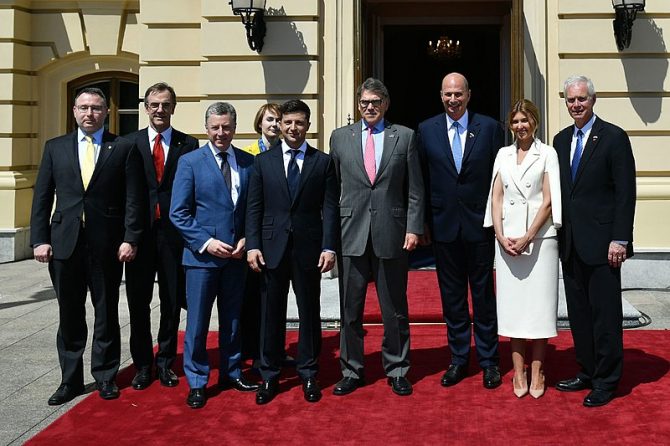
Photo from Wikimedia Commons
The Trump administration has challenged American norms of civil-military relations. Candidate Trump signaled that he would reverse established law and attack commonly held norms when he promised to reauthorize waterboarding, and he further challenged tradition by appointing an unusual number of serving and retired generals to senior positions and referring to them as “my generals.” In this hyper-partisan environment, the military has struggled to maintain a non-partisan position. Maintaining it became unexpectedly harder last week when a serving military officer, LTC Alexander Vindman, was drawn into the impeachment inquiry, and the president subsequently attacked him personally.
Faced with this challenge, the military’s priority is to remain outside the partisan fray and maintain its position as a trusted national institution. Political actors, including the president, are attempting to use the military’s prestige to bolster their positions. This prestige, however, rests on the tradition of non-partisanship.
Decisions about when and how to go to war are inherently political because they have political consequences, but the military has traditionally provided advice on matters with political implications while scrupulously avoiding any participation, even indirectly, in the partisan contestation of elections. In a time when every question is contested on a partisan basis, every answer becomes partisan. The military must tread an extremely narrow path to fulfill its obligations without straying any further than necessary into partisan conflict.
Testifying truthfully before Congress should not be a partisan issue, but there is no way to avoid appearing partisan in modern politics. Refusing to testify is perceived as partisan by the one party; agreeing to testify is perceived as partisan by the other. Assertions that LTC Vindman could be court-martialed for testifying are far-fetched, but he has been vilified in the conservative media and will likely retire at his current grade despite his stellar credentials.
LTC Vindman’s situation presents a dilemma for military leaders attempting to sustain non-partisan norms. So far, senior military leaders have neither criticized nor defended Vindman. There are no grounds for criticizing him, but to defend him would place the military establishment in direct conflict with the president and create the appearance that the military is taking a side in the impeachment debate. For military leaders, the priority should remain protecting the military’s non-partisan legitimacy. This may, unfortunately, include tolerating unfair treatment of one of their own. Up to a point, the institutional legitimacy of the military is more important than the mistreatment of one individual.
Opponents of the president may be tempted to make Vindman into a heroic symbol of resistance. They would be wise to resist the temptation. Conservative adulation of Lt. Col. Oliver North after he testified to Congress regarding the Iran Contra Affair in 1987 reinforced the growing perception at the time that the military was closely aligned with the Republican Party, which subsequently undermined the military’s credibility and prestige. [1]
The real test will come if the president and his supporters continue to attack Vindman publicly or attempt to take legal action against him. Retiring as a lieutenant colonel may be unfair, but it is a small price to pay for defending the norms of civil-military relations. If Vindman testifies in open hearings, the president and his supporters are likely to engage in public character assassination in order to undermine his testimony. The president has already shown his willingness to intervene directly in military legal proceedings.
Military leaders can be excused for accepting some costs to Vindman in exchange for protecting the military institution, but they cannot allow him to be prosecuted or maligned publicly by the president in a way that could make him a target. If the president pursues his standard playbook of innuendo and harassment, he will place military leaders in a lose-lose situation – either publicly contradict the president in a highly-charged partisan matter or publicly abandon an officer to be persecuted for his honorable service. The president should understand that unfounded public attacks risk reluctant repudiation by his senior military leaders, and those leaders should privately signal their willingness to do so before it becomes a public spectacle.
Senior uniformed and civilian military leaders must prioritize the military’s non-partisan integrity in a highly partisan environment, but they must realize that they risk the same dilemma as LTC Vindman. Whether he chose to testify or not, his actions were bound to be seen as partisan. Now, military leaders will face the same problem if the president forces them to choose between defending Vindman or abandoning him. The president and his supporters will view the former as partisan resistance, and Democrats will view the latter as partisan acquiescence. The president should avoid creating that dilemma, and military leaders should let him know now, before it again bursts into public view, that they too will speak truthfully and publicly if forced.
James W. Vizzard is a PhD student in political science at the Schar School specializing in American politics and civil-military relations. He served 26 years on active duty in the United States Army, including deployments to Saudi Arabia, Kuwait, Iraq, and Afghanistan. He earned a BA in history from the College of William and Mary, an MA in English from Colorado State University, and an MMAS in strategy from the U.S. Army Command and General Staff College.
[1] Peter Feaver and Richard H. Kohn, Soldiers and Civilians: The Civil-Military Gap and American National Security (MIT Press, 2001).



